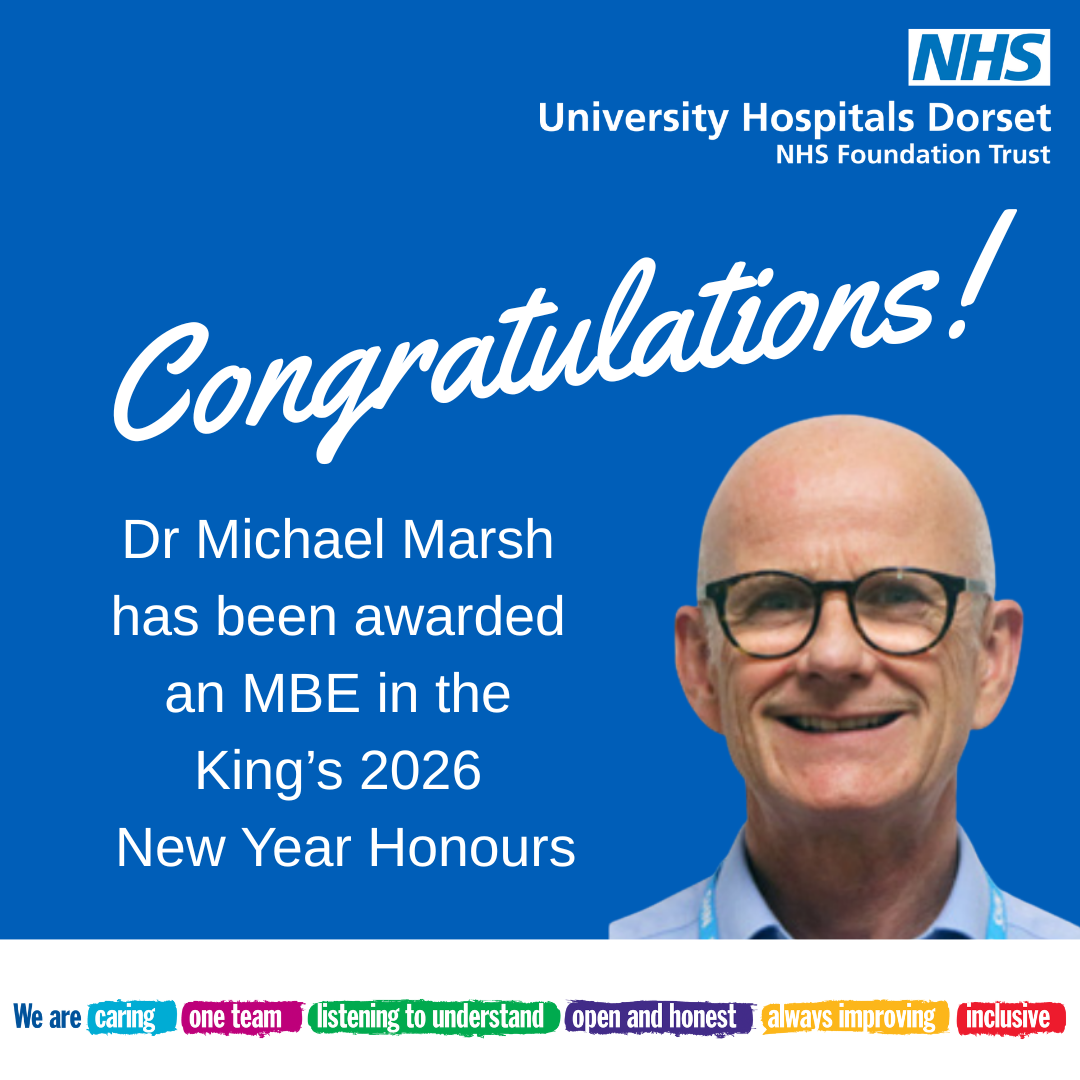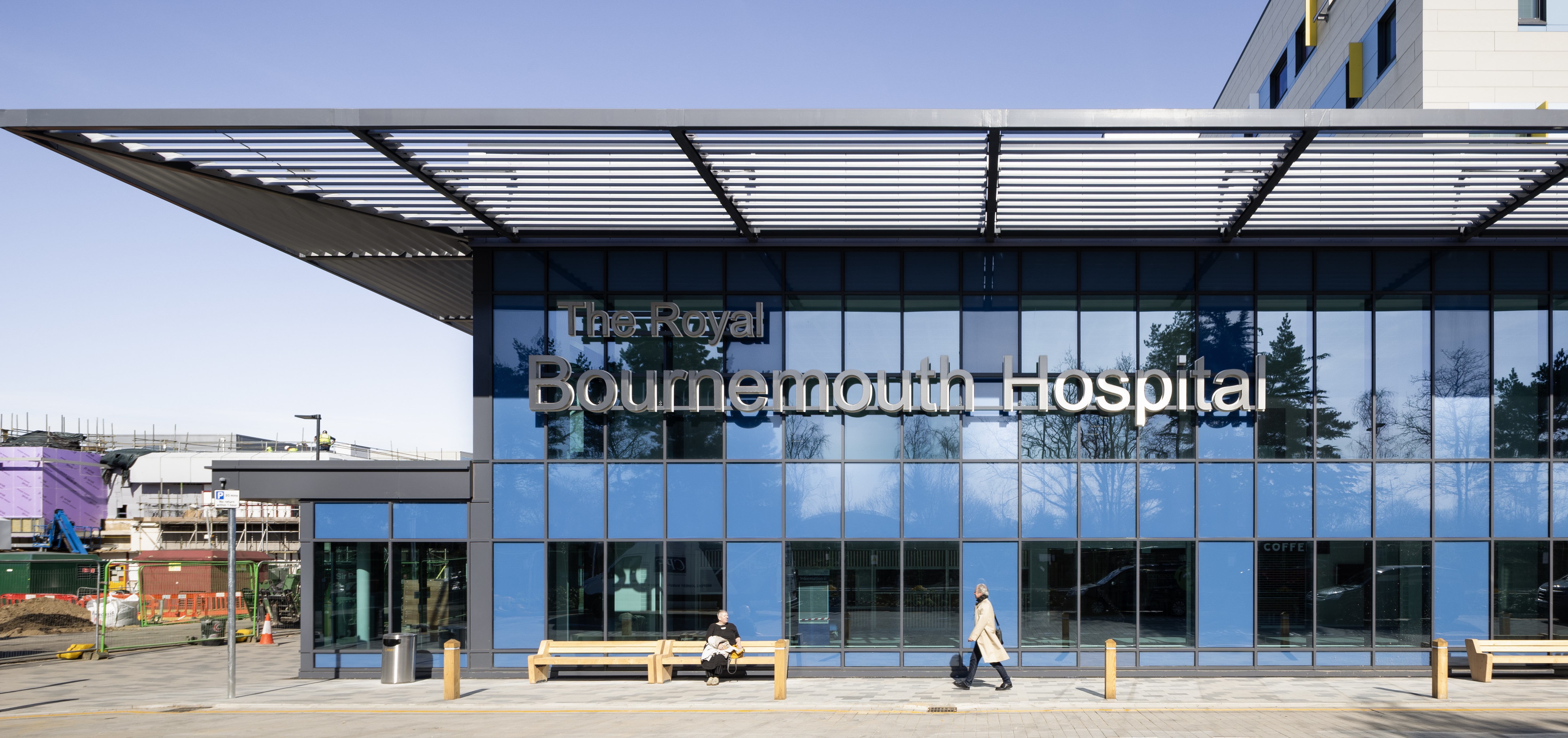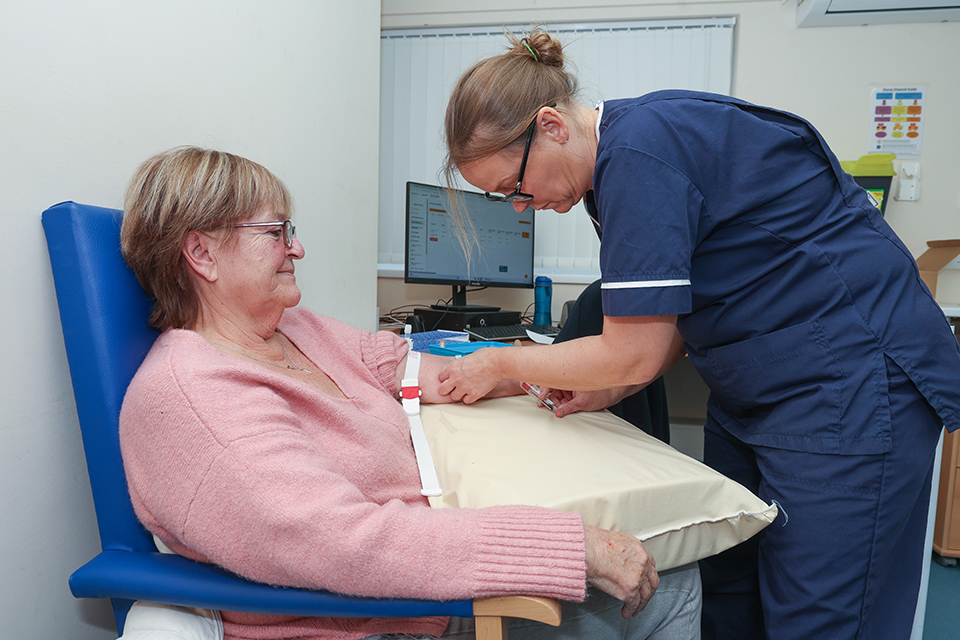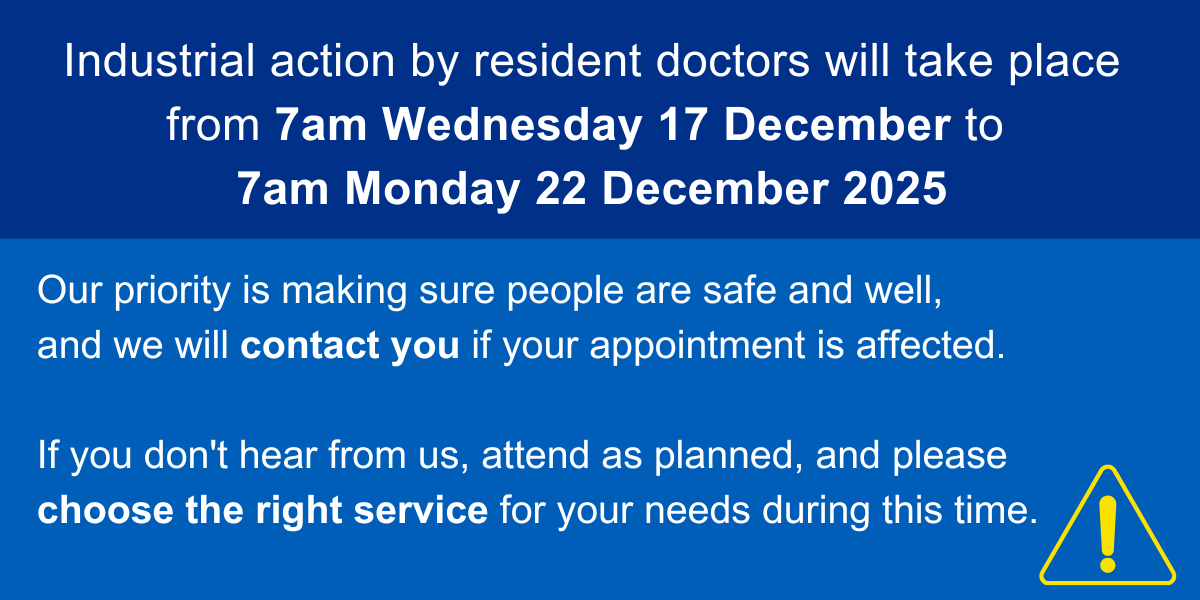Dr Michael Marsh awarded MBE
Congratulations to our non executive director, Dr Michael Marsh, who has been recognised with an MBE for his contributions to healthcare.
Dr Marsh established the first Paediatric Intensive Care Unit at University Hospital Southampton and later became Medical Director there before moving to NHS England. He now supports our hospitals in his non-executive role at UHD. This award reflects his exceptional leadership, clinical expertise and long standing commitment to improving patient care.
Dr Marsh said: “My entire career has been a joy and a privilege, firstly as a paediatrician caring for our most vulnerable and sickest patients, and as a medical leader improving services for the wider public. Now, in my non-executive roles at Moorfields and University Hospital Dorset, I’m able to continue to support high standards of clinical care.”

UHD buys remainder of Wessex Fields from BCP Council
University Hospitals Dorset has bought the remainder of Wessex Fields from BCP Council. This land is adjoining the Royal Bournemouth Hospital site. The sale comes at an important time as Royal Bournemouth becomes the major emergency hospital and Poole becomes the UK’s largest planned care hospital.
The immediate temporary use will be additional parking, benefiting patients, visitors, and staff. Feasibility work for geo-thermal energy will also be undertaken in 2026, to provide a reliable, local heating source.
Homes for key workers will also be planned. As well as helping to attract and retain staff, this will help ease traffic congestion, as staff will be able to walk to work. Other uses, allied to healthcare, will also be explored in the site masterplan that will be developed next year. These include centres for education and research.
Siobhan Harrington, Chief Executive of UHD said: “As we prepare for the next stages of delivering better emergency and planned care for our local population, Wessex Fields will help us in delivering even greater benefits. We look forward to working with partners to develop this exciting opportunity.”
Cllr Mike Cox, BCP Council Deputy Leader and Cabinet Member for Finance, said: “The sale of Wessex Fields represents a great opportunity for residents, bringing investment into the area that will regenerate a key site, create new jobs and build world-class medical research and development facilities, alongside hospital keyworker housing.
“Working with partners to improve health and wellbeing outcomes and reduce health inequalities in Bournemouth, Christchurch and Poole is one of our ambitions, so we’re pleased to be able to sell this land to University Hospitals Dorset.
“This sale also generates a substantial capital receipt for the council; bringing huge benefits to the area and getting best value for our residents.”

Dorset’s first specialist primary care commercial research centre
Poole-based GP surgery becomes official NIHR Primary Care Commercial Research Delivery Centre (PC-CRDC)
The Adam Practice has been research active for several years, working closely with the National Institute for Health and Care Research (NIHR) and regional organisations such as Wessex Health Partners to improve patient care through health research.
Becoming an officially-funded centre is part of national efforts to extend clinical trials beyond hospitals and into community settings, opening up high-quality research trials to many more people.
The new centres will support the shift of health research from hospitals into community settings. They will enhance access to clinical trials for people across England, particularly those in underserved groups and communities experiencing the greatest burden of ill health.

By ensuring fairer access to cutting-edge treatments and innovations such as medicines and vaccines through research, the centres aim to help people live healthier, longer lives.
The Adam Practice's research is driven by a commitment to advancing medical knowledge, improving treatments, and offering patients access to innovative therapies. The team has a strong focus on chronic disease management and preventative care. In recent years they have undertaken a wide range of studies including new treatments for migraine, diabetes, cardiovascular risk and obesity. Patients taking part might help trial new medication, try out a new device or simply answer questionnaires.
As part of this new centre, The Adam Practice will be working with several other practices to extend research opportunities to more people.
Quarter Jack Surgery, Wimborne
Poole North Primary Care Network (PCN)
Dr Patrick Moore, Director of the NIHR Dorset Primary Care Commercial Research Delivery Centre (PC-CRDC), said: “We are incredibly proud to have been selected to lead this important new centre. This award recognises the strength of primary care research in Dorset and will bring real benefits to patients across the region. By delivering more clinical trials through GP surgeries and local health settings, we can give people earlier access to cutting-edge treatments and ensure research reflects the needs of our communities. We look forward to working with patients, practices, and partners to make research more accessible, inclusive and part of everyday care.”
Rebecca Cutts, Co-Director of the NIHR Dorset Primary Care Commercial Research Delivery Centre and Clinical Research Nurse Lead, said: “This is a fantastic opportunity to grow the reach of research across Dorset and ensure that everyone has the chance to take part. Our focus will be on supporting practices, training new staff and removing barriers that stop people getting involved. We want to make it easier for patients to contribute to research close to home, whether in their GP surgery, the community, or even from home. This centre will put Dorset at the forefront of patient-centred, primary care research.”
Being research active means The Adam Practice can:
- Improve patient outcomes: clinical research helps discover new ways to prevent, diagnose and treat conditions, ultimately improving quality of life
- Offer access to innovation: patients can participate in trials, sometimes gaining early access to new treatments not yet widely available
- Benefit communities: working with local networks ensures that research opportunities are accessible to a wider population, not just a select few
The practice joins 13 other centres in becoming a PC-CRDC. The National Institute for Health and Care Research (NIHR) has awarded more than £14 million to GP-led primary care organisations across England to expand commercial research delivery and improve access to groundbreaking clinical trials.
The PC-CRDCs will form part of the NIHR-funded Commercial Research Delivery Centre (CRDC) UK Network, alongside the 21 CRDCs established in April 2025. Together these centres will work with industry, NHS delivery partners, other research delivery infrastructure and wider stakeholders to increase the attractiveness of the UK as a desirable global destination to carry out commercial research.
Visit the Be Part of Research website to learn more about research, search for opportunities and sign up to be contacted about studies that interest you.
The mission of the National Institute for Health and Care Research (NIHR) is to improve the health and wealth of the nation through research. We do this by:
- Funding high quality, timely research that benefits the NHS, public health and social care
- Investing in world-class expertise, facilities and a skilled delivery workforce to translate discoveries into improved treatments and services;
- Partnering with patients, service users, carers and communities, improving the relevance, quality and impact of our research;
- Attracting, training and supporting the best researchers to tackle complex health and social care challenges;
- Collaborating with other public funders, charities and industry to help shape a cohesive and globally competitive research system;
- Funding applied global health research and training to meet the needs of the poorest people in low and middle income countries.
NIHR is funded by the Department of Health and Social Care. Its work in low and middle income countries is principally funded through UK international development funding from the UK government.
Information for patients during industrial action
During times of industrial action, our priority is to provide safe care. Please help us by choosing the right services for your needs.
Key information for hospital appointments and patients
-
At times, we may have to postpone some appointments during industrial action. We will let you know directly if your appointment is cancelled. Please assume it is going ahead unless you are contacted directly.
-
No-one should put off seeking urgent or emergency care during the strikes and people with serious, life-threatening conditions will continue to be seen in our emergency departments.
-
Use NHS 111 online or by phone for other urgent care needs. If you are contacting 111, please give as much information as you can, as that will help you get the right support and advice.
-
For non-urgent care services please contact your GP practice to make an appointment.
Mental health support
If you need mental health support call Connection on 0800 652 0190. The Connection service is available 24 hours a day, seven days a week.
Visit your local pharmacy
Pharmacies can help with allergies, constipation, headaches, earaches and many other ailments.
Find a pharmacy near you.
Patient discharge
Staying in hospital for longer than necessary can have a negative impact on how well patients recover. Most patients will continue to recover at home once they leave hospital. In fact, many patients need to leave hospital to be able to complete their recovery fully.
Help us get patients who are ready for discharge home so our hospital beds are available for people who need them most urgently. Please speak to the ward team if you need more information and respond quickly to any calls from us about your relative leaving hospital.

A new way for patients to manage appointments
Throughout December 2025, we are piloting automated appointment cancellation and rescheduling at 11 outpatient clinics. If you are a patient of one of these clinics you will soon be able to cancel or reschedule your appointments via SMS, email, and by logging into the DrDoctor patient portal.
This is to help us communicate with our patients quickly if there is a need to change or cancel an appointment, make best use of our clinic time, and reduce wasted time due to non attendances. Other benefits are as follows:
- You can easily change or cancel your appointment
Patients can reschedule or cancel booked appointments using a secure link sent via SMS or email, without needing to call the hospital. - You’ll see real-time appointment options
When rescheduling, patients are shown live availability of alternative appointment slots, making it easier to find a time that suits them. - Your changes are instantly updated in hospital systems
Any rescheduling or cancellation is immediately reflected in the hospital’s records ensuring accurate records and freeing up slots for others. - You stay in control, but staff can step in if needed
While the system is patient-led, hospitals may review or approve changes for certain high-priority appointments. - Fallback options are in place
If no suitable slot is selected or the rescheduling process isn’t completed, the system ensures the original appointment is retained or flagged for manual follow-up by staff. - Your data is handled securely and reliably
The system uses bi-directional integration with hospital systems and maintains a full audit trail, ensuring the appointment data is safe and traceable.

Functionality may vary across the county and from your local NHS services. NHS Dorset will keep you updated with all the latest news, and to find out more, headhere.









